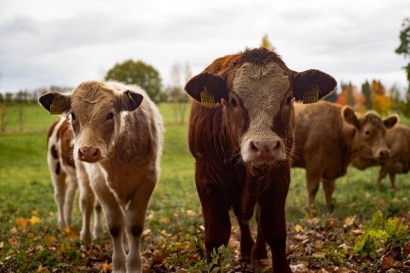
“I want to thank everyone who played a role in helping this first-of-its-kind project in Connecticut become a reality, from the Department of Agriculture providing funding assistance through the Farm Transition Grant for the project’s planning phase, to financing by the Green Bank,” Governor Lamont said. “Scaling up infrastructure that manages organic waste is so critical for our state’s sustainability goals. This innovative project is a win for our economy and our environment, and something that we hope to advance more of through DEEP’s participation in the Connecticut Coalition for Sustainable Materials Management, launched in August.”
Fort Hill Farms is a fourth-generation farm that currently has over 400 cows, 230 milking, and is part of two dairy farm cooperatives named The Farmer’s Cow and Agri-Mark (Cabot Cheese), which supplies products to both large, big box groceries and local markets. The farm has been regarded as “Best in New England” by Yankee Magazine, named Connecticut Tourism Ambassadors, and in 2013 was the first ever winner of Thompson’s “Business of the Year” Award. Due to their focus on local products and being named Connecticut Tourism Ambassadors, the farm is a popular destination for people to enjoy.
“Cows produce cow manure which can fertilize your gardens or make electricity for your home. This completes the circle, growing the food to feed the cows and then using cow manure to power our farm,” said Kies Orr, co-owner and operator of Fort Hill Farms. “It just feels good to be doing the right thing and being sustainable for the next generation.”
The digester project was developed by Ag-Grid Energy LLC, a company focused on anaerobic digestion technology, and is being constructed by Martin Construction Resource.
“Ag-Grid Energy is very excited to lead the installation of first dairy digester that produces renewable electricity in State of Connecticut,” said Dr. Rashi Akki, Founder and CEO of Ag-Grid Energy. “This project is a culmination of state’s supportive net-metering and food waste diversion laws. It has also been an excellent partnership between Town of Thompson, NRCS, DEEP and Eversource to allow for permitting of this very first such installation. We thank the City of Middletown and City of New Britain for also supporting this project by being the pioneers and purchasing the renewable electricity. We thank Connecticut Green Bank and Live Oak Bank for financially supporting of this project and Ag-Grid Energy in general.”
There are a number of benefits of integrating an anaerobic digester with a dairy farm. It helps to enhance farm sustainability with improved manure management, generates an additional income stream for the farm, and produces steady electricity generation. A digester also helps reduce methane emissions coming from cow manure, improving air quality and lowering greenhouse gases.
“We are very excited to have played a role in this project’s financing, and to help a local family farm continue to find ways to become more sustainable while creating a great product and being a tourist attraction,” said Bryan Garcia, President and CEO of the Green Bank. “Anytime we are involved with a ‘first’ in the state that supports our joint energy and environmental goals and opens doors to similar future projects, it’s a win for everyone.”
“Live Oak is very grateful to assist the development of this innovative project and support the joint venture between Fort Hill Farms and Ag-Grid,” said Max Vernier, VP, Head of Bioenergy, at Live Oak. “This is another great step forward in the decarbonization of the U.S., especially for the state of Connecticut, and a flagship project led by an impressive team of experts to demonstrate the full capability of a circular economy.”
Construction is anticipated to be completed next month.

